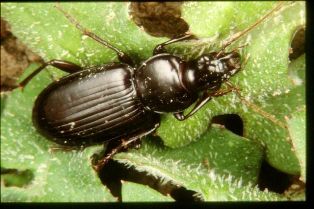Birds can be a pest around the horse property as they search for sustenance, fouling water and feed-bins and spreading weed seeds in their droppings. The presence of grain in horse feeds encourages larger numbers of birds, which can take a toll on trees and newly sown crops.
However, evidence gathered from the Integrated Pest Management for the Horse Farm report (2007), demonstrated that birds may also affect the incidence of intestinal parasites on the horse farm in ways that are both positive and negative.
When whole grains are fed to horses, birds are more likely to scavenge in their dung, causing it to spread and dry. The spreading of dung can also cause the drying of parasite eggs and larvae, reducing the viability for parasites to become infective third instar larvae, and lessening parasite burden of the paddock.
In warm, dry weather, the spreading of dung quickly reduces the moist environment in which parasite eggs and larvae flourish and develop. It is also true though, that the drying out and spreading of dung with a high parasite burden in cool, moist weather may facilitate the wider spread of parasites. A similar problem can arise when harrowing contaminated dung through a paddock in cool, moist weather conditions while horses are still in the paddock. Scattering of the dung
in this way is therefore less desirable than breaking it down by using methods allowing the establishment of dung beetles.

More Spreading Less Dung Beetles
Birds fossicking through dung searching for grain may also have a significant impact by eating the dung beetles. Flocks of ibis have been observed by horse owners, systematically going through dung in horse paddocks – a sure sign that
the beetles are active. Alhough the birds thoroughly spread the manure, to dry they also eat large numbers of beetles.
Spreading and desiccating dung also dries it quickly, and as dung beetles prefer fresh manure, this also impacts on their establishment. If trying to establish dung beetles, some research should be carried out to determine which species inhabit
the area, and when they are active, and leave dung in the paddocks during this time. Manure may be picked up after a few days from grazed areas, but left in the ‘roughs’ and toilet areas. The paddock can be harrowed before being rested,
leaving plenty of composting matter for worms to process and enrich the soil.
During the pest management study run by the Integrated Pest Management, fortnightly collections were made from 1-48
hour old dung pads at several control sites, recording the number of pads with dung beetle activity and dung pads that had been scattered by birds. Dung of the same age was also collected in a two litre bucket and examined so that worms
present could be identified and quantified. It was found that birds scattering the dung destroyed the moist habitat the parasites require, reducing the parasite burden and accelerating the breakdown of dung.
Many Living Things in Dung
Also identified in the collected dung were a variety of other life forms that may predate on horse parasite eggs and larvae included staphylinids, spiders, ants and predatory mites. Earthworms, millipedes, beetles and flies living in dung also have a composting effect on the dung.
The natural roles of predatory insects in reducing equine intestinal parasites and improving pasture can be encouraged by restricting the use of chemicals, mulching pasture by mowing and resting, and adding natural compost in the form
of composted manure. Birds can be attracted by feeding grain to horses; conversely, to reduce unwanted bird
activity, whole grain may be steam rolled, crushed or soaked to make it more easily digested by the horse.
Acknowledgement: This article is courtesy of The Green Horse



